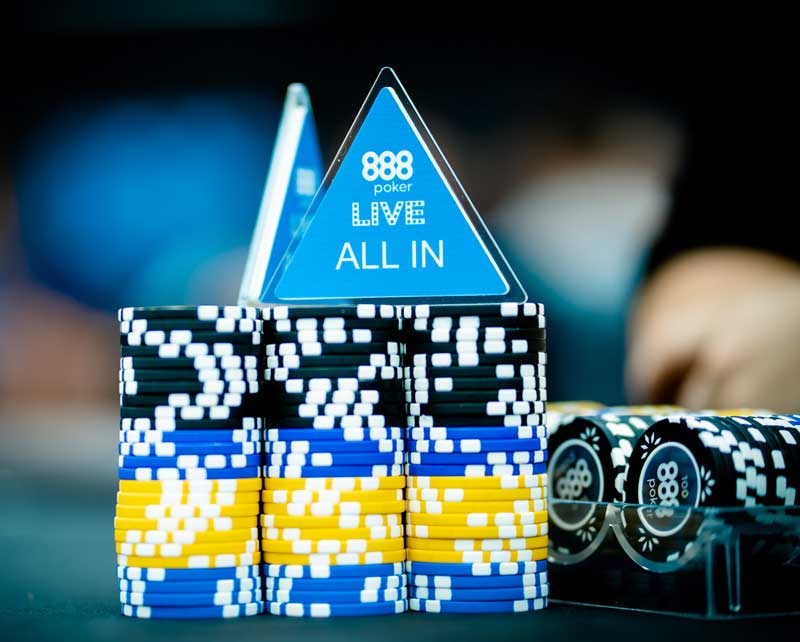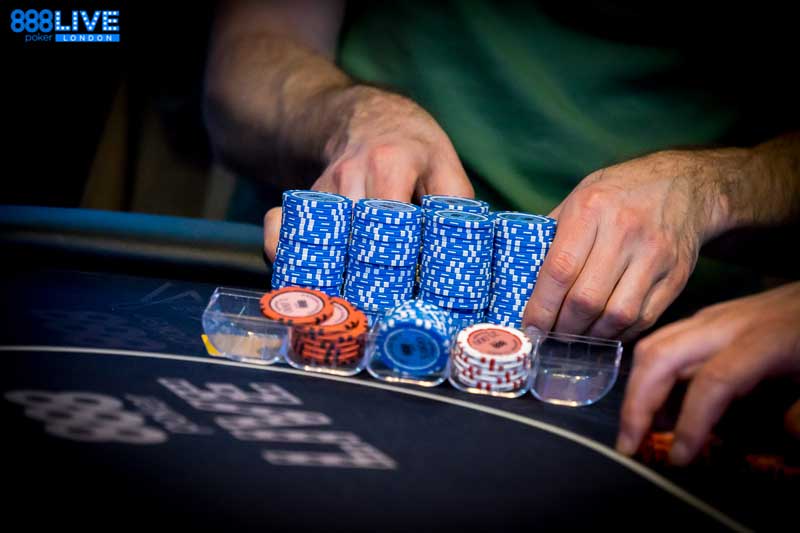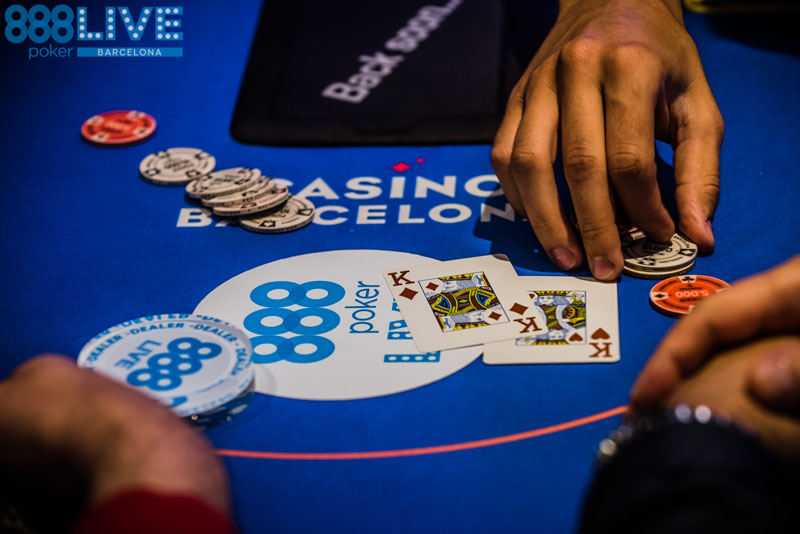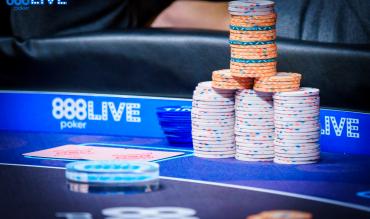Ask me what is the most essential consideration when playing a hand in a cash game? I would say it’s not position or my cards or my opponents. It’s my stack size relative to the blinds.
Consider a hand like the one below in a deep stack game with effective stacks (the smallest of the stacks involved in a hand) of 400 big blinds.

How much are you likely to lose with this hand?
I doubt you are going to put a lot of money in the pot with a single pair of 3s or 5s because there will be overcards on the board. You will only get committed when you make a hand like a straight, trips, two pair, etc.
So, the times that you lose, you’ll lose a small pot, but there is the potential to win big.
In a short-stacked game, you have much less potential to win a lot of chips. Your implied odds are minimal. But as the stacks get deeper, most hands become playable due to the high amount of money you can win if you hit a monster.
Let’s explore this.
Consider a few scenarios for different sized effective stacks:
Effective Stacks - 25 Big Blinds
With 25 big blinds, you want to play your big cards. All the money will probably go in if you play a hand and hit something. Also, you won’t make big draws and super strong hands often enough to justify playing weak holdings.
- Poker is relatively straightforward with these stack sizes.
- There will be less bluffing because there is not that much at stake.
- Players will become pot-committed more easily and so are less likely to fold.
 Players will become pot-committed more easily
Players will become pot-committed more easily
I should point out that you will often be in tournaments with this type of stack size. That’s completely different from cash games because your stack is your only lifeline in a tourney.
In a cash game, it’s okay to go broke if you get it in as a 60-40 favourite because you will be a winner in the long run. If you get it in too often as a 60-40 favourite in a tournament, you will soon be a spectator.
One other note about 25 big blinds: You should never have this short a stack in a cash game. Being that short takes away everything that makes poker interesting, fun, and profitable.
Granted, short effective stacks are not always avoidable. You will occasionally be heads-up against a very short stack - some guy who buys in for the table minimum and does not rebuy until he loses it all.
| You may consider these players, usually only found at the lowest stakes, annoying. But they are probably donating to your game, so I guess you shouldn’t be too angry with them. |
I recommend always adding on to your stack if you fall below 100 BB. But, if that’s too steep, then consider playing at lower stakes.
Effective Stacks - 100 Big Blinds
At 100 big blinds effective, poker gets much more interesting. You have room to manoeuvre (and bluff!). You can play more implied odds hands like suited connectors in position.
- Implied odds are just big enough that it is worth all the small losses when you hit a big hand and get paid off.
Many cash games in casinos open up at 100-big-blind max buy-in. So, until the table is running for a while, there will be a lot of play at this level. Over time, the stacks will get deeper, but when new players join, you will be playing against their stack size.
So, it’s a good idea to get comfortable playing at this stack depth because it is so common.
Effective Stacks - 500 Big Blinds
At effective stacks of 500 big blinds, anything goes. Your implied odds are so enormous that you should be able to play any two cards.
In fact, a case could be made that a hand like

is more profitable than

Whether you believe that or not, I think it’s constructive to consider the argument that, with huge stacks, you are better off with 44 than KK.
I will lay out the justification for that position below.
Your Entire Net Worth
I don’t think playing poker for your entire net worth is a good idea. But, I want to illustrate an extremely specific point.
Say that you are dealt the following hand, and someone goes all in -

Would you call?
Obviously, in any normal situation, you would call. But, if someone else has a pair, you will win 80% of the time. The other 20% of the time, you will be homeless and penniless.
That does not sound too appealing.
Even if you have a 95% chance of winning after the turn, it’s not a good idea to call off your entire net worth. You don’t want to end up bankrupt one time out of twenty.
So, when your stack size is your entire net worth, you need counselling. But also, you should not play any hands, as it is too risky. Hand selection becomes easy.
Fold everything and get away from the table as quickly as possible.
 Fold Everything and Leave the Table.
Fold Everything and Leave the Table.
In general, in cash games, you want to play when your Expected Value (EV) is positive. But if you are playing beyond your means, you will make bad decisions.
Let’s look at a hypothetical scenario -
You are a middle-aged person with a life savings of $500,000. Nice job. You have a mortgage, a car loan and a spouse who likes fine things.
Warren Buffet comes up to you and offers to flip a fair coin.
- If it is heads three times in a row, he will give you a billion dollars.
- But if not, well, then you have to give him your $500k life savings.
Would you take this bet?
(In this hypothetical, you are not allowed to take out insurance or find a backer or investor.)
Let’s examine your Expected Value:
87.5% of the time, you lose $500,000 = - 437,500
12.5% of the time, you win $1,000,000,000 = 125,000,000
Total expected value: $124,562,500
So, you would expect, on average, to win over 124.5 million dollars.
But you only get to play once.
Now, I know that some gamblers would probably take this bet (you know who you are).
But if they lose, which will happen the majority of the time –
- That spouse who likes fine things will leave them.
- The dog will run away.
- The house will be repossessed.
- And they’ll probably get fired for missing too much work while agonising about the one that got away.
In short, this is not a good bet under this life circumstance.
Unless you have the nuts on the river, you do not want to get your entire life savings involved.
And even then, I’m not sure I would because I have occasionally misread my hand or the board.
Just not worth it.
Now let’s return to that first scenario…
Is 44 Better Than KK with Very Deep Stacks?
This section may be very controversial. And you may totally disagree with any notion that 44 can be a better hand than KK.
But I want to make the best case I can. Then you can decide for yourself if I’ve convinced you.
Stacks are 500 BB.
Say your opponent raises 3BB with KK, and you call in position with 44.
We will consider the following four scenarios:
- Neither hand hits the flop.
- KK flops a set, 44 misses.
- 44 flops a set, KK misses.
- Both hands flop a set.
Neither hand hits the flop.
In this case, KK bets half the pot on the flop, and 44 folds. KK wins 4.5 BB – a tiny pot.
KK flops a set, 44 misses.
KK checks to trap. 44 also checks because of the overcards. Most likely, the turn misses both hands, and so KK bets for value, and 44 folds. Again, KK wins a tiny pot.
44 flops a set, KK misses.
This scenario gets more interesting. 85% of the time, when the flop contains a 4, it will not also contain an A. In this situation, KK bets, 44 raises, and KK calls. There will be more betting on the turn and the river.
In most instances, no A will come, and the 44 will win a pretty big pot. 15% of the time, the flop will contain a 4 and also an A. In this instance, the KK will worry about the A.
The KK player will probably call one bet but not a lot of raises. So, the 44 will win a medium pot.
Both hands flop a set.
Any way you slice it, KK is going to win a big pot. Bad beats happen.
44 vs KK Hand Analysis
 44 vs KK Hand Analysis
44 vs KK Hand Analysis
So, let’s consider the various scenarios again:
- Neither hand hits the flop (75%)
- KK wins a small pot.
- KK wins a small pot.
- KK flops a set, 44 misses (12%)
- KK wins a small pot.
- 44 flops a set, KK misses
- 44 wins a considerable pot 85% of the time (no ace flops)
- 44 wins a medium pot 15% of the time.
- Both hands flop a set (1.3%)
- KK wins a huge pot.
So, KK wins a huge pot 1.3% of the time, and 44 wins a huge pot 10% of the time.
- While KK wins many small pots, the huge pots dominate over lots of small pots.
Overall, the 44 should win more money than the KK with very deep stacks.
One exception to this is if the stacks are super, super huge. If the stacks are ridiculously huge, then the amount of money that KK will win in the 1.3% of the times they both flop sets might outweigh all the other scenarios.
Assuming that when only the fours hit a set, the KK is able to fold when the 44 tries to bet too much. Most good players will not lose an enormous pot with just one pair and will assume they are beat when the bets get big enough.
- But the 44 is going to give up many more chips when flopping a set. So, when both flop sets, the KK will be paid off - big time.
So, when playing super deep stacked cash games, would I rather be dealt 44 or KK?
The answer is, of course, KK.
But it’s fun to consider how the value of the weaker hand goes up significantly when playing deep stack cash games.
At the very least, it’s clear that the relative value of these two hands fluctuates as stacks get deeper.
Stack Sizes - Additional Thoughts
In the example above, we only looked at remarkably simple action pre-flop. There was a raise and a call. When facing a three-bet, even with deep stacks, it usually makes sense to fold the fours.
- The implied odds rarely justify the frequent loss of this many chips.
- Consider also that you don’t know that the opponent has KK and will pay you off.
- So, you might hit your set and get nothing.
On the other hand, in 3-bet pots, many players are more likely to stack off because the stack to pot (SPR) ratio is lower. So, they’re more likely to get pot committed.
The analysis also changes if there are multiple players involved pre-flop. In general, with deep stacks, I love seeing a flop with a small pair.
- The implied odds are higher as more players can pay you off.
- This scenario more than offsets the times that one of the other players hits a higher set.
Obviously, you have to play the set carefully with super deep stacks on a coordinated board. But the nice thing about sets is that they can always improve on the turn or river. So, you’re rarely drawing dead.
Another consideration not covered by my simplistic example is the skill level of the players.
- A seasoned pro will win more with a set of 4s against KK than a recreational player.
- Likewise, the pro will lose less with KK against a recreational player’s set of 4s.
Small pairs are easier to play than big ones because you improve to a set and play them strongly or miss and fold. In contrast, big pairs are hard to get rid of, even if they don’t improve on the flop.
So, less experienced players may do better with small pairs than big pairs over time.
The takeaway from this article is that while it’s essential to consider the following –
- Position
- Your cards
- Your opponents
- The action
The factor that should dictate your pre-flop hand selection the most is the effective stack size.
Understanding this fact should help your cash results tremendously.


